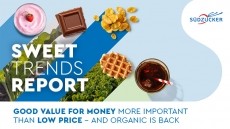Barry Callebaut invests in mixes
the European chocolate and cappuccino vending mix business with the
acquisition of cappuccino mix company AM Foods from Nordic dairy
firm Arla Foods.
The buyout will bring €60 million in sales, 100 employees and a production facility into the Swiss firm, which will absorb the new company into its Gourmet & Specialties business unit that had sales of €319.8 million in 2002/03.
Vending mixes accounted for approximately one tenth of total sales for Barry Callebaut last year.
"The acquisition of AM Foods allows us to achieve two goals: first, to have our own high-quality production facility and, second, to strengthen our position in Europe, a region where out-of-home consumption is rapidly growing and which is still under-equipped with vending machines in comparison to North America or Japan," said Benoît Villers, president of Barry Callebaut's Gourmet & Specialties business unit.
Terms of the agreement were not disclosed but both firms are hoping the transaction, subject to regulatory approval, will be completed by 1 September this year.
For the Danish dairy giant, divesting the non-strategic vending mix business, which reported an operating profit of €2.9 million last year, allows it to focus on core activities in the dairy industry.
In April this year, Barry Callebaut said that recent acquisitions had boosted its six month figures, with net profit showing double-digit growth. First half net income to February this year rose 10 per cent to SF83.6 million (€53.3m) helped by acquisitions in its consumer chocolate unit, which offset the impact of low cocoa prices on its processing business.
"Barry Callebaut has continued to grow more than twice as fast as the global chocolate market," said Patrick De Maeseneire, CEO of Barry Callebaut.
The chocolate firm, which processes some 520,000 tonnes of cocoa annually out of a market of 3.1 million tonnes, has cut back on this side of the business, impacted by current low cocoa prices on the market.
"Over the last month we have continued to experience steady origin arrivals from Africa that have surpassed earlier expectations. This has culminated in an unbearable cocoa hedging weight on the market and a fund sell off below 900 reaching a two year low at 801, " a trader at UK firm Sucden told FoodNavigator.com at the time. Cocoa futures prices hit 17-year highs above 1,600 pounds a tonne at the pinnacle of the civil war in the world's top producer Ivory Coast in late 2002, but have been declining since then.




























